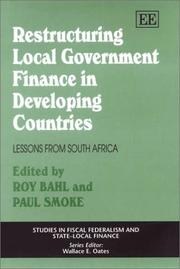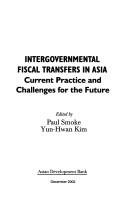| Listing 1 - 10 of 15 | << page >> |
Sort by
|
Book
Year: 2001 Publisher: Geneva UNRISD
Abstract | Keywords | Export | Availability | Bookmark
 Loading...
Loading...Choose an application
- Reference Manager
- EndNote
- RefWorks (Direct export to RefWorks)
Book
Year: 1990 Publisher: Cambridge, Mass. Harvard Institute for International Development
Abstract | Keywords | Export | Availability | Bookmark
 Loading...
Loading...Choose an application
- Reference Manager
- EndNote
- RefWorks (Direct export to RefWorks)

Abstract | Keywords | Export | Availability | Bookmark
 Loading...
Loading...Choose an application
- Reference Manager
- EndNote
- RefWorks (Direct export to RefWorks)
Decentralization in government --- Fiscal policy --- Local government
Book
Abstract | Keywords | Export | Availability | Bookmark
 Loading...
Loading...Choose an application
- Reference Manager
- EndNote
- RefWorks (Direct export to RefWorks)
International and domestic efforts to respond to the severe global challenge of climate change are on the rise and evolving. Despite the importance of action from multiple levels of government, public sector reforms to address climate change and to promote decentralization and or intergovernmental relations tend to be designed and managed separately. Intergovernmental relations have administrative, fiscal, and political dimensions. This paper focuses on climate action at the subnational government level through administrative decentralization and intergovernmental collaboration. The Paris Agreement acknowledges the climate change-decentralization connection, noting a need for the engagement of all levels of government and various actors. The bottom line is that the appropriate mix of subnational climate actions will vary because climate change needs and feasible responses, as well as intergovernmental structures and the nature and degree of decentralization, differ across countries. The paper is organized as follows: section one gives introduction. Sections two and three, respectively, provide concise summaries of basic climate change issues and policies and the principles and practices of decentralization and intergovernmental relations. Section four covers the intersection of climate change action and decentralization. Section five reviews administrative decentralization for climate change action. Section six presents illustrative cases drawn from secondary materials to illustrate how selected administrative functions are used in specific situations and the types of interactions among them. Section seven concludes with some synthetic observations and offers general guidance on assessing the prospects for enhancing and supporting subnational administrative action on climate change.
Adaptation To Climate Change --- Carbon Emissions --- Climate Change --- Climate Change and Environment --- Climate Change Impacts --- Climate Change Mitigation and Green House Gases --- Decentralization --- Environment --- Environmental Economics and Policies --- Governance --- Local Government --- National Governance --- Natural Disasters --- Public Sector Development --- Solar Energy

ISBN: 9715614523 Year: 2002 Publisher: Manila Asian Development Bank
Abstract | Keywords | Export | Availability | Bookmark
 Loading...
Loading...Choose an application
- Reference Manager
- EndNote
- RefWorks (Direct export to RefWorks)
Public finance --- Asia --- Intergovernmental fiscal relations --- Revenue sharing
Book
Abstract | Keywords | Export | Availability | Bookmark
 Loading...
Loading...Choose an application
- Reference Manager
- EndNote
- RefWorks (Direct export to RefWorks)
This paper provides background for the Government of Indonesia as it considers if and how to introduce more robust local government performance incentives into the intergovernmental fiscal framework. The next section briefly examines the forces that have driven the recent national wave of interest in improving local government performance. This is followed by a review of the relatively limited set of local government performance incentives currently in force in Indonesia. The fourth section provides a conceptual overview of how to think about the possible expansion of local government incentive programs, outlining the potential role(s) of such programs in general and the key issues involved in designing and implementing them. The fifth section tentatively considers a number of options for additional local government incentives in Indonesia that the central government may wish to consider pursuing. The paper concludes with an outline of next steps for moving forward with the possible development of more purposeful and meaningful performance incentives in Indonesia's intergovernmental fiscal framework.
Accounting --- Capacity Building --- Capital Expenditures --- Debt Restructuring --- Decentralization --- Decision Making --- Developing Countries --- Economic Development --- Expenditures --- Finance and Financial Sector Development --- Financial Management --- Governance --- Intergovernmental Relations --- Legal System --- Local Government --- Macroeconomics and Economic Growth --- Moral Hazard --- Public & Municipal Finance --- Public Sector --- Public Sector Development --- Reserve Funds --- Revenue Sharing --- Tax Administration --- Taxation & Subsidies --- Transparency
Book
ISBN: 1626373825 9781626373822 9781588267320 1588267326 Year: 2010 Publisher: Boulder : Lynne Rienner Publishers,
Abstract | Keywords | Export | Availability | Bookmark
 Loading...
Loading...Choose an application
- Reference Manager
- EndNote
- RefWorks (Direct export to RefWorks)
It is increasingly difficult to find developing countries whose leaders have not debated or implemented some type of decentralization reform. But has decentralization worked? Does it actually help a country to deepen democratic governance, promote economic development, or enhance public security? Under what conditions does it justify the enthusiasm of those who have pushed so successfully for its adoption? The authors of this volume sift through the accumulating evidence to assess how well decentralization has fared. Focusing on consequences rather than causes, their goal is to inform future interventions in support of decentralized governance by showcasing some of the important trade-offs that it has generated so far.
Book
ISBN: 0195727878 Year: 1994 Publisher: Nairobi Oxford University Press. Eastern Africa
Abstract | Keywords | Export | Availability | Bookmark
 Loading...
Loading...Choose an application
- Reference Manager
- EndNote
- RefWorks (Direct export to RefWorks)
Book
ISBN: 082138841X 0821388401 Year: 2011 Publisher: Washington, D.C. : World Bank,
Abstract | Keywords | Export | Availability | Bookmark
 Loading...
Loading...Choose an application
- Reference Manager
- EndNote
- RefWorks (Direct export to RefWorks)
Decentralization in government --- Economic development --- Economic assistance --- Government - General --- Law, Politics & Government --- Political Institutions & Public Administration - General --- Economic aspects --- Political aspects --- Economic aid --- Foreign aid program --- Foreign assistance --- Grants-in-aid, International --- International economic assistance --- International grants-in-aid --- Development, Economic --- Economic growth --- Growth, Economic --- Centralization in government --- Devolution in government --- Government centralization --- Government decentralization --- Government devolution --- Economic policy --- International economic relations --- Conditionality (International relations) --- Economics --- Statics and dynamics (Social sciences) --- Development economics --- Resource curse --- Political science --- Central-local government relations --- Federal government --- Local government --- Public administration
Multi

ISBN: 9781626373822 Year: 2022 Publisher: Boulder Lynne Rienner Publishers
Abstract | Keywords | Export | Availability | Bookmark
 Loading...
Loading...Choose an application
- Reference Manager
- EndNote
- RefWorks (Direct export to RefWorks)
| Listing 1 - 10 of 15 | << page >> |
Sort by
|

 Search
Search Feedback
Feedback About UniCat
About UniCat  Help
Help News
News